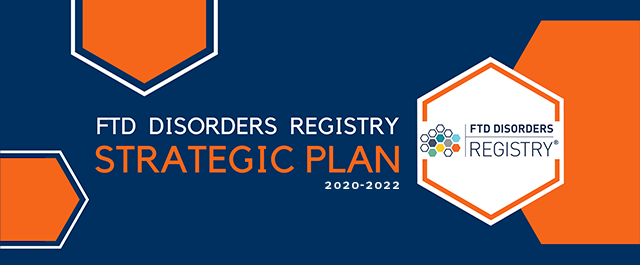PRESS & NEWS
FTDDR Announces 2020-2022 Strategic Plan

The FTD Disorders Registry (FTDDR) has announced the release of its first Strategic Plan.
The FTD Disorders Registry (FTDDR) has announced the release of its first Strategic Plan. Covering the years 2020-2022, this written plan focuses on expanding the Registry’s reach and continuing to provide value to participants and partners.
“As the Registry’s first formal strategic plan, we have set challenging, and a few slightly audacious, goals,” noted Registry Director Dianna Wheaton, M.S., Ph.D., CHES. “Our intent is to strengthen and evolve the Registry to better serve the myriad and dynamic needs of the FTD research community.”
The Registry’s mission is to facilitate and advance research into the spectrum of FTD disorders and to accelerate the development of treatments. The plan is to do this by providing tools and resources that promote and support research participation, enable access and sharing of data with researchers, and amplify the voice of the patients’ and families’ lived experiences.
“The Registry connects real people to the latest scientific research and gives them a powerful new role in the development of new treatments,’’ said Patrick Brannelly, managing director of the Tau Consortium, a Registry supporter. He is also a former member of the FTDDR Management Committee.
The Strategic Plan shares the history and growth of the Registry as well as detailed strategies and tactics for its four foundational goals:
In order to achieve these goals, the Registry will use the plan to develop and drive decisions to meet the predetermined outcomes. Some of these proposed outcomes include expanding the Registry’s reach to increase the representation of minority and underserved populations, storing participants’ genetic data, and providing a portal for researchers. Additionally, FTDDR will be taking steps to enlarge the geographic scope for eligible international participants to enroll in Registry research.
“It is all about bringing value to participants and partners while also bringing hope to those affected by FTD,” said Dr. Wheaton.
“The Registry encourages broad-based collaboration and welcomes your partnership to help us reach our goals,” she said. “Together we can make a difference, change the course of these diseases, and find a cure.”
IN APPRECIATION
The Registry would like to acknowledge our founders, The Association for Frontotemporal Degeneration and the Bluefield Project to Cure Frontotemporal Dementia. Together they nurtured the vision of a person-centric registry and cultivated input from the FTD community to guide our design and implementation.
The Rainwater Charitable Foundation, Tau Consortium has also been instrumental in supporting the Registry from its earliest days to the present. Additional sponsors, known and anonymous, have contributed to our sustainability.
We are also appreciative of our relationships with allied patient advocacy groups, such as CurePSP and clinical research collaborators, including the ARTFL-LEFFTDS Longitudinal Frontotemporal Lobar Degeneration (ALLFTD) multisite research consortium.
Finally, the Registry extends our deepest thanks to persons diagnosed with FTD, their family members, and caregivers for sharing their stories and entrusting us with their data.
We thank you all for your support and partnership!
Together we can find a cure for ftd
The FTD Disorders Registry is a powerful tool in the movement to create therapies and find a cure. Together we can help change the course of the disease and put an end to FTD.
Your privacy is important! We promise to protect it. We will not share your contact information.



